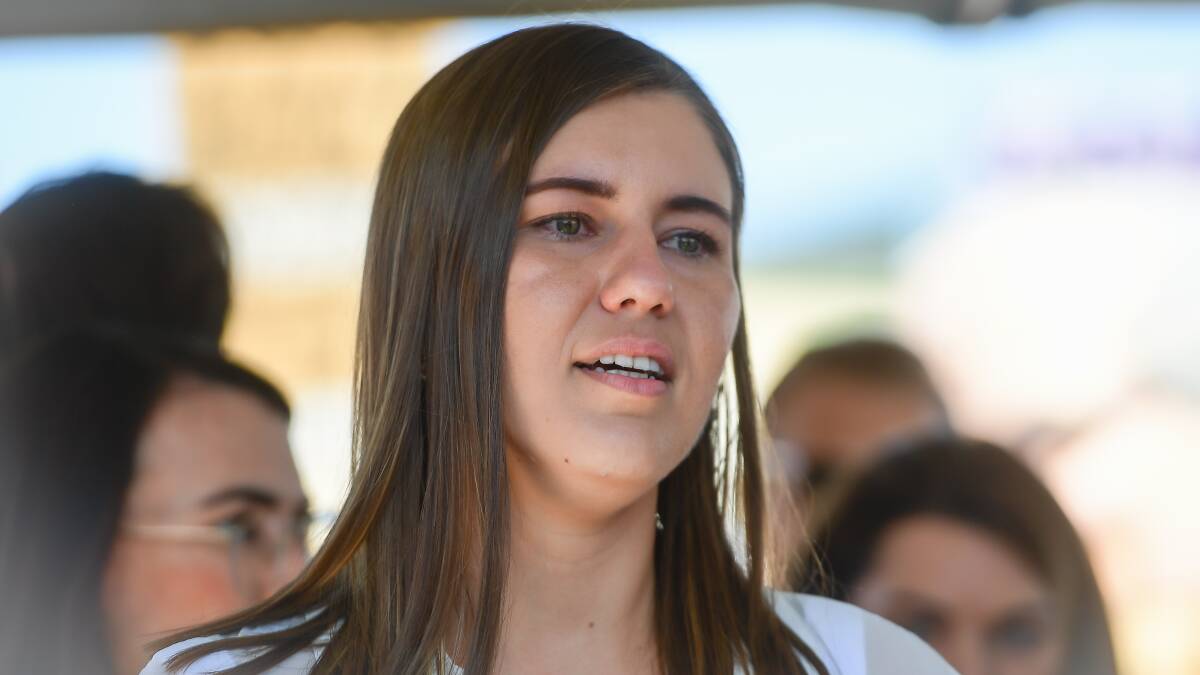
A bill to introduce an affirmative model of consent into ACT law has received backing from Grace Tame and Brittany Higgins, who has labelled it as a turning point for the territory.
The landmark reform would make sweeping changes to the ACT's consent laws with a statutory definition of consent to be included that is based on free and voluntary agreement.
Labor backbencher Marisa Paterson is expected to introduce the proposed amendments to the Crimes Act to the Legislative Assembly this week. She said she was incredibly passionate about the reform.
"I think this reform will deliver some kind of justice to victim-survivors of sexual assault in the ACT," Dr Paterson said.
An affirmative model of consent is one based on people communicating agreement of consent, essentially a "yes means yes" model rather than "no means no".
It would also make clear a person can withdraw consent at any time.
The bill also clearly articulates circumstances when consent is not given, these include cases where a person does not say or do something to resist the act or cases where a person may have consented to another act with the same person.
Ms Higgins, an ANU Global Institute of Women's Leadership visiting fellow, and Ms Tame, a former Australian of the Year, have both thrown their support behind Dr Paterson's proposed bill.
The pair, who are prominent advocates for victim-survivors of sexual assault, are set to address the National Press Club on Wednesday.
"We have a chance to address the systemic issues of sexual violence and improve access to justice for all victim-survivors," Ms Higgins said.
"This is an acknowledgement that we are all responsible to seek enthusiastic consent. Someone isn't saying 'yes' just because they don't say 'no' or do not physically resist.
"Victim-survivors have lived silently with the trauma of sexual violence for too long. These reforms will seek to deliver systemic reform that will assist them in getting the justice they deserve."
Dr Paterson released a draft exposure bill in June last year. She said the bill received overwhelming support during its four-week consultation. The bill was also presented to the ACT government's sexual assault response and prevention taskforce.

Some minor technical changes were made to the bill.
"I feel like on Tuesday, we'll be delivering a bill that is really thorough," Dr Paterson said.
"I have confidence that we engaged with a full range of stakeholders and views on this and that we're delivering something that is best practice."
Affirmative consent laws were passed in NSW late last year.
Victim advocates and lawyers have expressed concerns about the alarmingly low rate of reported sexual offences that make it to trial in the ACT.
During the 2020-21 financial year there were 13 trials for sexual offences in the ACT Supreme Court but there was a guilty verdict in only four trials.
But over the first 10 months of 2021, ACT Policing received 262 reports of sexual assault. Of the matters, 68 were under investigation or before the court, 79 victims had provided a formal statement and 115 had declined to provide a formal statement.
A similar bill was introduced by former Greens member Caroline Le Couteur in 2018 but her attempt was halted following a committee inquiry.
Ms Le Couteur's bill proved contentious as a perpetrator would have to prove they knew, or would have known, consent was freely given.
MORE A.C.T. POLITICS NEWS:
- Anti-corruption watchdog releases report into Glebe Park land deal
- Canberrans asked to keep using Check In CBR app, despite end to contact tracing
- Renewed calls for development west of Tuggeranong
Dr Paterson believed her bill rectified this issue.
"There was a lot of issues with the previous bill. The onus of proof was on the perpetrator, so it was no longer innocent until proven guilty and so it couldn't ever succeed," she said.
"This bill retains that you are innocent until proven guilty, however, it holds that you must seek consent for a sexual act ... [in the current legislation] you have to prove that you did give consent."
The ACT affirmative consent laws will deliver systemic reform to assist survivors of sexual violence to get the justice they deserve. 🙏
— Brittany Higgins (@BrittHiggins_) February 6, 2022
To quote @SaxonAdair, this is an acknowledgement that we are all responsible to seek enthusiastic consent.https://t.co/SiTGgZEU86
The bill is expected to be referred to the ACT Legislative Assembly's Standing Committee on Justice and Community Safety.
Dr Paterson is hopeful the bill can pass by the end of the year.
A damning report into the ACT's responses to sexual assault released late last year found victim-survivors in the territory were often retraumatised through their experiences with the territory's justice system, community and government agencies.
The report found reform needed to go beyond the justice system as legislative reform would not be enough.







